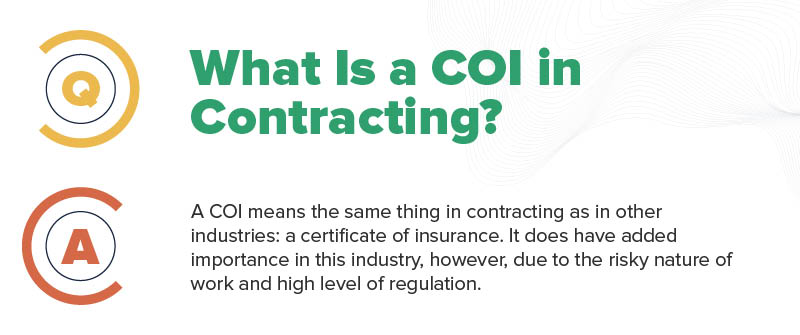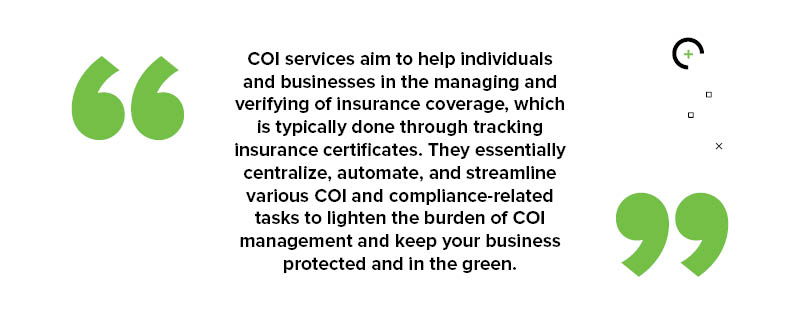
Contractors typically carry liability insurance to protect all parties from damage and on-site injuries if anything were to go wrong in the building process and to protect the parties hiring them from downstream risk. Many states legally require coverage as a prerequisite for contractors to get their business licenses.
But how do contractors prove that they have the insurance they say they do, and how can the businesses and individuals that hire them be sure that everyone involved is protected and compliant? The answer lies in COIs.
In this blog, we’ll discuss what a COI means in the contracting world and how those managing contractor COIs can get the compliance help they need to protect their business effectively.
What Is a COI?
A COI is an important document in the world of contracting. It refers to a certificate of insurance, an official document providing key details of a policyholder’s coverage. They can only be issued by an insurance agent/broker from the agency providing the coverage to the policyholder receiving it.
Certificates of insurance typically reflect important policy information such as:
- Insurance company
- Policyholder
- Policy types
- Policy limits
- Effective dates
- Policy exclusions
- Certificate holder(s)
- Additional insured(s)
- Policy endorsements
What Is a COI in Contracting?
A certificate of insurance for contractors means the same thing in contracting as in other industries: a certificate of insurance. It does have added importance in this industry, however, due to the risky nature of work and high level of regulation.

Contractors must often provide a COI to clients, project owners, general contractors, or other hiring parties as part of contractual agreements or legal requirements. It helps assure the hiring party that the contractor has appropriate insurance coverage to protect them from potential liabilities such as property damage or injuries that could occur on the job.
Typically, contractors are asked to provide evidence of their general liability insurance and workers’ compensation insurance by providing insurance certificates that reflect and explain their current coverage for those policies.
What Is a COI and How Do I Get One?
As the contractor wanting to prove your coverage status, to obtain a COI, you must officially request one from your insurance broker or agency. It’ll typically look something like this:
- You contact your insurer by phone, email, or online portal and request a COI proving X type of insurance coverage for X amount of time.
- You provide them with the necessary details and wait a few days (up to a few weeks) for them to issue it.
- You receive the official document and hand it off to the requesting party!
As the contractor’s hirer, all you need to do to get their COI is ask them for one. Most contractors will be aware of this practice since it’s prevalent in the industry to provide proof of insurance coverage before beginning a job.
Once you have the COI in hand (or on-screen), you can begin to validate that it meets your requirements and keep track of it throughout the business relationship. To do this, you will need to manually verify all of the details on the COI itself. Although it can be difficult, COI management is just as important as COI obtainment, so many businesses choose to streamline the process with sophisticated COI services like myCOI.
What Is the Purpose of COI Services?
Certificate of Insurance services aim to help individuals and businesses in the managing and verifying of insurance coverage, which is typically done through tracking insurance certificates. They essentially centralize, automate, and streamline various COI and compliance-related tasks to lighten the burden of COI management and keep your business protected and in the green.

Here are a few benefits that COI services can bring:
- Ensuring compliance. Whether your insurance requirements are set by you, vendors, or other regulatory bodies, it’s important to have the necessary coverage in place to reduce the risk of legal issues, contract violations, and headaches associated with unexpected claims.
- Risk mitigation. Verifying and validating COIs helps businesses mitigate potential risks. By confirming that all hired contractors have appropriate insurance coverage, your business can safeguard itself against potential losses from accidents or damages.
- Efficiency and time savings. COI services streamline tedious, mundane, and error-prone tasks. But mostly, they save you money and energy by dealing with fewer claims.
- Centralized storage and access. A huge piece of COI tracking and management is maintaining a database of relevant, up-to-date files. COI services like myCOI’s offer an online platform to store and organize your COIs for easy access—no physical folders necessary.
- Renewal tracking. Our COI services also include automated renewal tracking, which will notify you when your COIs are nearing expiration, ensuring that your certificates are kept up to date and helping you and your contractors avoid lapses in coverage.
How myCOI Can Help
Managing contractors and maintaining compliance is no easy feat. Let myCOI take on the heavy lifting so your contractors can, too. With a dedicated team of experts and unparalleled industry experience, we can help you optimize your COI management. Contact us today to learn more.